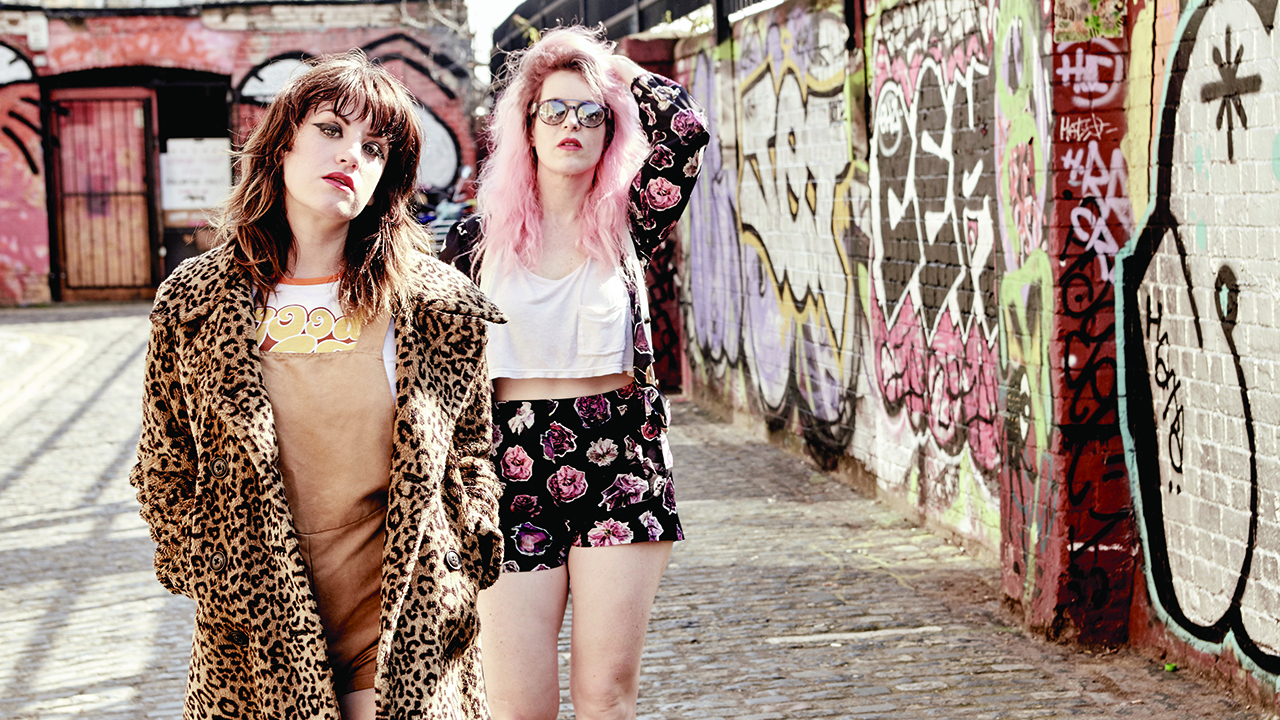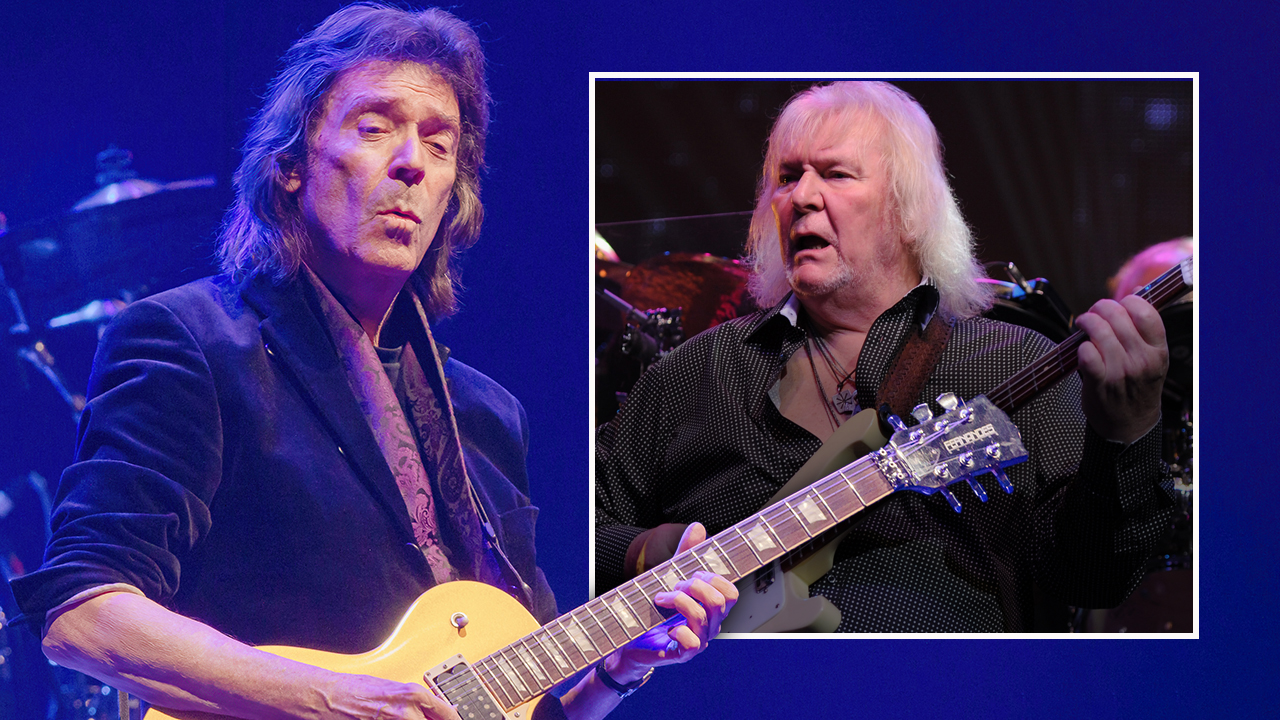Six Things You Need To Know About Deap Vally
We delve into the minds of knitting, ass-kicking rock duo Deap Vally

“It doesn’t smell great, but it looks cool,” Lindsey Troy observes. The singer/guitarist, together with drummer Julie Edwards, are on a photo-shoot in one of East London’s graffitied side streets. Troy isn’t wrong about the smell, but it does make a cool backdrop for this similarly cool duo.
Deap Vally look like LA hipsters. They sound like LA hipsters, with their nonchalant, dragged-through-treacle drawls and references to things like “being present”. But don’t dismiss them: they’ve just released one of this year’s best rock albums. Following their debut blast of noisy blues rock (2013’s Sistrionix), Femejism is an exhilarating blend of garage, surf rock and psychedelia, wrapped in straight-up, riffy rock’n’roll. Post-shoot we sit down with them in a Brick Lane cafe to find out more.
If Led Zeppelin teamed up with Hole it’d sound like Deap Vally.
A varied diet of trendy psychedelia (“I love King Gizzard And The Lizard Wizard,” Troy says, grinning), 90s grunge and old-school classic rock has served them well. Since forming in 2011, they’ve supported Muse, the Mars Volta and Wolfmother, among others.
“As a teenager watching MTV I saw an Alice In Chains video and it just spoke to me,” recalls Edwards. “That was the beginning of the hard music I listened to.”
“I had No Doubt’s Tragic Kingdom,” Troy reveals, of the albums she picked up early on, “but also The Beatles, The Doors, Marvin Gaye, Nirvana…”
Deap Vally are smart, not preachy.
Sign up below to get the latest from Classic Rock, plus exclusive special offers, direct to your inbox!
Femejism is laden with articulate observations of 21st-century life, from the effortlessly cool, understated feminist anthem Smile More to Gonnawanna with its razor-precision jibes at social media culture.
“Self-consciousness is pretty challenging to overcome,” Edwards muses. “Now more so than ever, with everybody having their own micro-celebrity culture of themselves, which is essentially what happens on social networks. It’s hard to be punk today. But you can’t really fight it. So eventually people will adjust – maybe they won’t have neurotic problems, or maybe everyone will have narcissistic personality disorder and it won’t be a ‘disorder’ any more.”
- Six Things You Need To Know About Scorpion Child
- Six Things You Need To Know About Purson
- Six things you need to know about Crobot
- Six Things You Need To Know About Tax The Heat
They started young, Troy as a folk singer…
Growing up in a musical household in the San Diego suburbs, Troy and her sister formed a folk duo. Their father, who has written books on the Grateful Dead, was a keen advocate.
“My parents were very gung-ho about having kids who played music, and there was a bit of a family band scenario,” she says. “I grew up playing open-mic nights and coffee houses from when I was ten and eleven.”
When Troy was 15 she and her sister got a record deal with Elektra. An album and tour followed, only for their single to crash and burn. “Thank God,” she says. “Our hearts were not in it at all. It’s hard when you’re young and in a very adult industry.”
…and Edwards in the theatre.
Meanwhile, in San Fernando valley, the young Edwards dreamed of being an actress. She listened to West Side Story instead of rock’n’roll, and spent much of her childhood in school plays, summer musical theatre and community dinner theatre.
“I used to wear T-shirts that said ‘Born To Act’,” she says dryly. “But my parents wouldn’t let me get an agent until I was sixteen, and then I was too old. I met some children’s agent and she was like: ‘We’re gonna change your name to TJ McSparkles!’ or something. And I was like, ‘What are you talking about? I’ve had sex. I’m not a child.’”
The Who had a big impact.
Aged 19 and on diet pills, Edwards discovered Keith Moon. “I became unhealthily fixated,” she says. “I saw him on the cover of Mojo magazine and I was like: ‘Who is that?’ I became totally obsessed. I got every book about his life and took notes and underlined stuff. I was the Rain Man of Keith Moon.”
Knitting brought them together.
By the time she was 32, Edwards owned a knitting shop in Atwater Village, LA. One day Troy, then 24, walked in. Having bonded over needlework and Led Zeppelin, she gave Edwards a copy of her EP. “She had no bra and a stain on her shirt, and I was like, I kinda like the sloppiness,” Edwards remembers. “And when I taught her, she learned really quickly. Then she gave me her EP and I thought her voice was great; her writing was awesome.”
These days they knit hats on long drives and sell them at shows, or give them to the A-list rock acts they support: “We gave them to the Red Hot Chili Peppers,” Edwards says, nodding.

Polly is deputy editor at Classic Rock magazine, where she writes and commissions regular pieces and longer reads (including new band coverage), and has interviewed rock's biggest and newest names. She also contributes to Louder, Prog and Metal Hammer and talks about songs on the 20 Minute Club podcast. Elsewhere she's had work published in The Musician, delicious. magazine and others, and written biographies for various album campaigns. In a previous life as a women's magazine junior she interviewed Tracey Emin and Lily James – and wangled Rival Sons into the arts pages. In her spare time she writes fiction and cooks.
